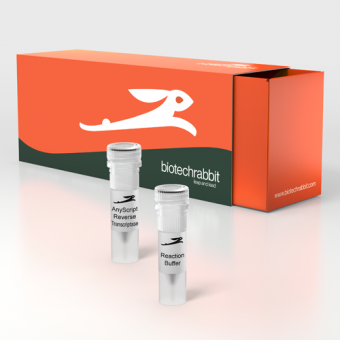Biotechrabbit은 바이오의약품 및 생명과학 연구를 위한 고급 실험 재료와 서비스를 제공하는 회사입니다.

제품 설명
AnyScript™ Reverse Transcriptase, 200 U/µl
제품 번호
BR0401001 - 20,000 Units
BR0401002 - 100,000 Units
제품 특징
Description
biotechrabbit™ AnyScript Reverse Transcriptase is an improved and genetically engineered MMuLV Reverse Transcriptase with reduced RNase H activity and increased thermostability. The enzyme is ultrapure and free of RNases and Nucleases known to spoil RT reactions; this makes AnyScript a perfect choice for first strand cDNA synthesis at higher temperature that MMuLV. AnyScript is active up to 55 °C with high yield and full-length cDNA product. The enzyme is tailored to be employed in both two step and one step RT-PCR and qRT_PCR with high sensitivity and specificity.
Superb sensitivity and specificity make AnyScript an ideal enzyme for fast RT reaction from low template input in diagnostics application.
Other Information
Unit DefinitionOne unit is the amount of enzyme activity that incorporates 1 nmole of dTTP into acid insoluble fraction in 10 minutes at 42°C when poly(A)+ RNA and oligo(dT)20 are used as template–primer. Quality ControlExonuclease assayLinearized lambda/HindIII fragments are incubated with the Reverse Transcriptase in a 50 µl reaction mixture for 4 h at 37 °C. No degradation of DNA was observed. Endonuclease/Nick ActivitySupercoiled plasmid DNA is incubated with the enzyme in a 50 µl reaction mixture for 4 h at 37 °C. No conversion of covalently closed circular DNA to nicked DNA detected. Contamination with E. coli DNAAbsence of E. coli genomic DNA is confirmed by qPCR using a sample of the enzyme and specific primers targeting the E. coli 16S rRNA gene. No contamination detected. RNase AssayAn RNA template is incubated with the enzyme in a 20 µl reaction mixture for 1 h at 42 °C. No RNA degradation observed. Functional AssaycDNA synthesis with oligo(dT) and/or Hexamer primers, followed by PCR. |
Protocols
RNase contamination is an exceptional concern when working with RNA. RNase A, providing most threat to RNA integrity, is a highly stable contaminant of any laboratory. To prevent RNA from degradation and to minimize possibility of contamination during cDNA synthesis; follow the guidelines below:
Component | Volume | Final concentration |
dNTP Mix (10 mM each dNTP) | 1 µl | 0.5 mM (each dNTP) |
RNase Inhibitor, 40 U/µl (optional) | 0.5 µl | 1 U/µl |
Oligo (dT)12–18 (10 µM) – or Hexamer Primer (100 µM) – or Gene Specific Primer (10 µM) | 2 µl 2 µl 0.2 - 2 µl | 1 µM 10 µM 0.1 - 1 µM |
5× Reverse Transcriptase Buffer | 4 µl | 1× |
RNA Template | 50 ng – 2 µg total RNA or 50–500 ng mRNA (polyA) |
|
AnyScript Reverse Transcriptase | 0.5 - 1 µl | 10 - 20 U/µl |
RNase-free water | Variable |
|
Total volume | 20 µl |
|
Biotechrabbit에서 다양한 제품을 찾아보세요!
Biotechrabbit - Official Distributor in South Korea "Morebio" 한국 공식 대리점 "모아바이오"